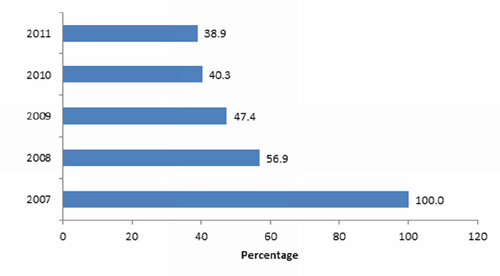
Top stories






More news


Marketing & Media
Ads are coming to AI. Does that really have to be such a bad thing?













During this period, only a small number of new businesses were established in the study area, implying a net decline of almost 50% in the small business population in the study area. Business survival was particularly low among street vendors (hawkers) and home-based businesses.
Until recently, township areas were mainly dominated by small, mostly informal, businesses offering basic products and services to the township communities. The majority of these were located in small business centres and on residential sites or operated as street vendors at major transport intersections. The rapid increase in consumer expenditure by residents in township areas during the past decade, together with the fact that the overwhelming majority of township dwellers (83% in the case of Soweto, for example), expressed no intention of moving out of their townships, created substantial market potential in these areas. This has resulted in a drastic change in township retail structures. Large shopping malls have been developed, or are under construction or in the planning phase in almost all township areas with sizeable population numbers. This development has resulted in heightened competition for small township businesses with a potential risk of considerable consumer expenditure displacement away from them to national chains and franchise businesses in the new shopping complexes.
The highest stability was evident among small businesses operating from 'old' business centres where 55% were still operational from the same premises. They were followed by 33.1% of home-based businesses (eg spaza and tuck shops) and only 12% of street vendors. The relatively low percentage of street vendors operating from the same premises is to be expected - they are mobile and may easily roam to alternative locations offering better trading opportunities or simply close down.
Prof Ligthelm identified prominent differences between businesses who survived and those who closed down. Survey results indicate that:
This suggests that the impact of shopping mall development on small business survival cannot be explained uni-dimensionally, purely attributing a decline in small business activity to shopping mall development. It is interesting to note that the same business sector, namely grocery and general dealers, that shows the highest level of mortality from 2007 to 2011, also remains the most important business sector among the survivalist businesses - just less than half the businesses (47.4 %) were still in operation in 2011.
The prominent role of entrepreneurship in business survival emerges from the analysis confirming the importance of the human factor in business survival.
The mortality rate among small businesses that failed to discount the heightened level of competition was considerably higher than among businesses that adjusted their business strategies to the changed competitive environment.
Entrepreneurial initiatives such as updating business and operational plans, formulating marketing policies and regularly analysing the competitive environment resulted in the adjustment of strategies such as changing/limiting the product range and reducing employment - ultimately aimed at ensuring business sustainability.
The report, entitled Small Business Success and Failure in Soweto: A Longitudinal Analysis (2007-2011) (Research Report no 412) is available from BMR.
Figure 1 - Survival Rate of Small Businesses in Soweto 2007-2011
